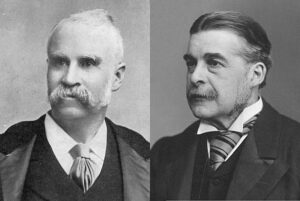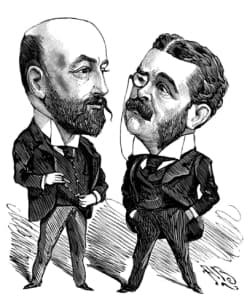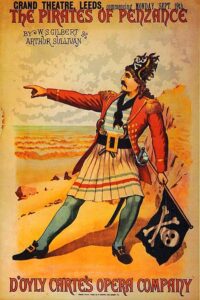•
(Caution: Contains spoilers for Episode: S22E05: For Death Prepare)
Diesen Artikel gibt es auch auf Deutsch.
•
Right at the beginning, we see a house on a river with the inscription ‘Empson Playhouse’. A man comes out of the front door with a poster in his hand and hangs it on the wall of the house next to the entrance.On the beige background, which appears to have yellowed, is a tall, black-haired pirate holding a sabre in his right hand. It says “The Midsomer Mummers – The Pirates of Penzance – Centenary Charity Concert – 5th – 8th May”.
The film location for the Midsomer Mummers theatre has been The Mill in Sonning, Berkshire, for a hundred years. Instead of “Empson Playhouse”, the building actually says simply “The Mill”. This is because the former mill is actually used for theatre performances.
Gilbert & Sullivan are ubiquitous in the UK, so it’s no surprise that Midsomer County is home to performances of their popular operas. And we’re not really surprised when a body is found in the treasure chest during rehearsals for such a performance, are we? But there’s more: Here Sarah Barnaby follows in Joyce’s footsteps and is present when the body is found.
Yes, Gilbert & Sullivan operas can seem as convoluted and fantastically over-the-top as Murders in Midsomer, but there is often a socially critical, satirical note in the background.
“Gilbert & Sullivan” is born

Arthur Seymour Sullivan (1843-1900) was first known as an outstanding organist and composer of church music. On a trip to Paris with Charles Dickens in 1862, he met the Italian opera composer Gioachino Rossini, who probably inspired him to write for the stage. Rossini’s admirers criticised Sullivan for wasting his talent on light music.
Sullivan became a successful opera composer. As one of Britain’s great composers, he was knighted by Queen Victoria in 1883.
In 1870, through the impresario Richard D’Oyly Carte (1844-1901), he met the playwright William Schwenck Gilbert (1836-1911), who was known to be both prickly and generous. In 1871 he made a first attempt to bring the two together, but it was unsuccessful.
When Carte became director of the Royalty Theatre in early 1875, he needed a short opera to follow Jacques Offenbach’s La Périchole. He contacted Gilbert to see if he had a suitable libretto and suggested that Sullivan set it to music. Gilbert had a suitable play, Trial by Jury, and Sullivan was delighted and set it to music within a few weeks. The piece was a huge success, outlasting the run of La Périchole and being revived at another theatre.
The beginning of a great collaboration? No, not yet, because Gilbert and Sullivan could not come to an agreement with Carte and his financiers. It was not until two years later, at Carte’s instigation, that a syndicate of the three men came together to form the Comedy Opera Company in 1877. They published a series of comic operas, the third of which was The Pirates of Penzance.
Le coup de théâtre…
As already mentioned, Gilbert & Sullivan’s works appear on the surface to be light music, the content even comic or tragicomic, full of plot confusion and nonsense logic. But this was deliberate: by means of parody, the proverbial “turning upside down”, the operas criticised the spirit of the times, the ever faster rhythm of life in a mechanised, externally determined, materialistic world. Full of coups de théâtre.
Of course, a reference to the coup de théâtre is inevitable in this episode. I think it’s the first time since 01×01: Written in Blood that the coup d’théâtre has been mentioned in a Midsomer episode. Back then, writer, teacher and voluptuary Brian Clapper was trying to explain to the young people in the drama group at Causton Comprehensive what a coup de théâtre was: a sudden, unexpected twist that adds a certain drama to the proceedings. In the age of storytelling, it is more commonly known as a plot twist. (Yes, I love this episode.)
The sudden end of “Gilbert & Sullivan”

Well, back to the Gilbert and Sullivan collaboration: a total of 14 operas were written between 1877 and 1890, then the syndicate broke up over financial disputes. Actually, it was just a dispute over a red carpet, which Gilbert thought should be renewed, but which only Carte would pay for. In principle, only the impresario should pay for the upkeep of the theatre that Carte had built especially for Gilbert & Sullivan’s operas.
Carte disagreed and the whole affair so enraged him that Gilbert ended the partnership of the three men and even hired men to storm the theatre at night to steal sets and costumes for Gilbert. This was Gilbert’s way of starting a rival production. But the thieves were caught and Gilbert became even more furious. He took legal action against Carte and eventually won the case.
Sullivan’s personality was at odds with Gilbert’s quick-tempered nature and he was notorious for avoiding conflict. By doing nothing, Sullivan sided with Carte in Gilbert’s eyes. Sullivan was utterly shocked by Gilbert’s behaviour; it took its toll on him.
Carte then tried to run the theatre on his own as an impresario, but he was unsuccessful. A tragic end without the parodic comedy of the Gilbert & Sullivan operas.
The Pirates of Penzance…
The two-act opera Pirates of Penzance premiered on 29 December 1879 in Paignton, Devon, England, to rave reviews.
“That no composer can meet the demands of Mr Gilbert like Mr Sullivan, and vice versa, is a fact universally admitted. One might imagine that the verse and the music had grown up at the same time, so closely and firmly are they interwoven. Apart from this consideration, the score of The Pirates of Penzance is one to which Mr Sullivan must have given serious thought”. (Source: “Music”, The Graphic, 10 April 1880, p. 371)
The audience is transported for a good 100 minutes to the Cornish coast in 1877, contemporary with the time of the work/play and ubiquitous in that period.
We meet Frederic, an orphan who grew up with the pirates. Now 21, he decides to leave the pirates and quickly meets and falls in love with Mabel and her friends. And then the turbulence, the hullabaloo begins: Mabel is the daughter of the general, who wants to arrest the pirates. And the pirates call Frederic back to them, because he was born on 29 February, so he is only 5 ¼ years old. Frederic obeys, and the lovers promise to remain faithful until Frederic is allowed to leave the pirates at the age of 84. In the meantime, however, things go back and forth between the general and the pirate king.
… and Midsomer County

After rejoining the pirates, Frederic feels it is his duty to inform the Pirate King of the Major General’s deception. He is furious and vows revenge. “Away, away! My Heart’s on Fire!” is the name of the trio of Frederic, the Pirate King and Ruth. Sarah Barnaby is practising Ruth’s part it in the kitchen, much to John’s chagrin, when Sergeant Winter enters the room. He surprises all by intoning the Mabel’s of the duet “All is prepared”. The Sergeant knows the duet because he used to sing the female part at school.
Sarah Barnaby is delighted that Jamie can sing parts of the opera. When she wants to continue rehearsing, John hastily gets up from the breakfast table and leaves the rest of his cereal because he is not a fan of Gilbert and Sullivan operas. But later, Jamie Winter has to step in for the Midsomer Mummers to play the General’s Sergeant. We see and hear him at the end of the episode with the aria “When a Felon’s Not Engaged in His Employment”, in which the Sergeant muses that even pirates, as outlaws, are ultimately like everyone else and it is a disgrace to take away their freedom.
I think the chaos of Midsomer pleased Gilbert & Sullivan and perhaps inspired them to write a new opera. And it wasn’t the first time we’d heard of a performance at Midsomer: Back in Written in Blood (01×01), there is a poster on the notice board in Midsomer Worthy’s village green stating that Midsomer Worthy’s Gilbert & Sullivan Society performed Pirates of Penzance in the summer of 1997.
Read more about Midsomer Murders & History
The Chronology of Midsomer County by Year or by Episodes
Deep Dives into Midsomer & History
This is an independent, non-commercial project. I am not connected to Bentley Productions, ITV or the actors.

Literature
- Ainger, Michael: Gilbert and Sullivan. A Dual Biography. Oxford 2009.
- Williams, Carolyn: Gilbert and Sullivan: Gender, Genre, Parody. New York 2010.
First published on MidsomerMurdersHistory.org on 26 January 2024.
Updated on 20 January 2026.


3 thoughts on “Gilbert & Sullivan: Pirates of Penzance and Midsomer”